There is a notable holiday in the Church Year calendar that gives us an opportunity to give thanks to the Lord for a unique disciple of Paul the Apostle and an inspired teacher of our church, the Evangelist Saint Luke. His designated feast day, October 18, is perhaps, like Holy Cross Day (September 14), the date of dedication of a church that was named in his honor.
Luke wrote two large books of the New Testament, together comprising over a fourth of its content, and those are actually two volumes of one work, referred to as Luke-Acts. He wrote an introduction, or prologue, to both of them (see Luke 1:1-4 and Acts 1:1-3) and addressed it to a Christian named Theophilus. The theory about this unknown man is that he had been already taught about Jesus and baptized, but he requested Luke to present a clearer and more orderly account of our Lord and His mission from beginning to end. Theophilus could possibly have also helped finance the major project, which in terms of our money today, might have cost over $10,000 to produce a single copy of each book!
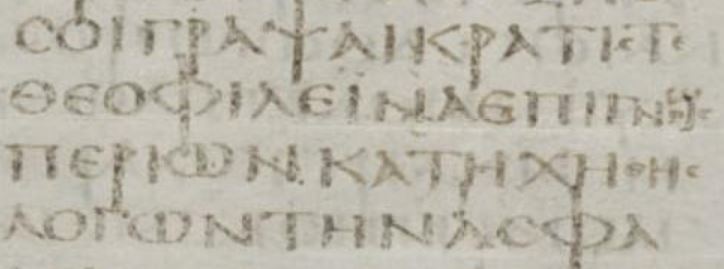
Codex Sinaiticaus Luke 1 “soi grapsai, kratiste theophile, ina epignos peri hon katechethes logon ten …
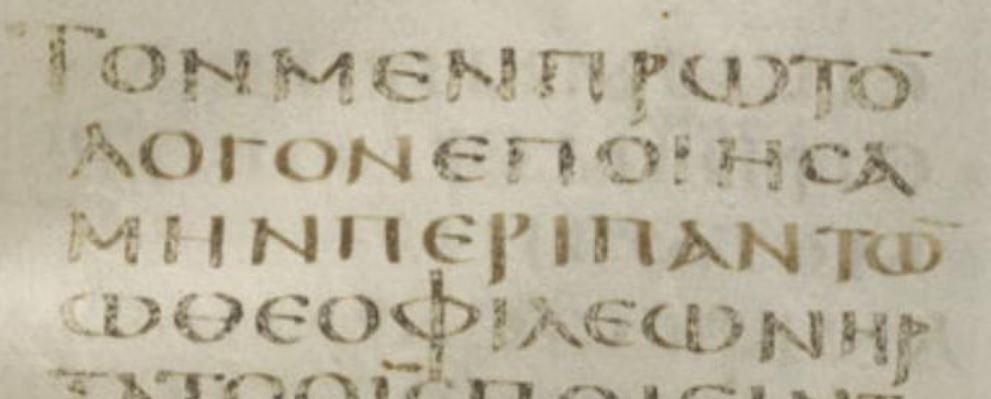
Codex Sinaiticus, Acts 1 “ton men proton logon epoiesamen peri panton, ho theophile, hon…
Luke probably grew up a Gentile, living not far from the Apostle Paul’s hometown of Tarsus, near the border of Syria and Turkey. When Paul received the vision and call from the Lord to begin proclaiming the Gospel in Europe, Luke joined him as he sailed for Philippi. This is clearly indicated in the book of Acts when all of a sudden the narrator changes pronouns from “he” to “we.” (See Acts 16:10) It seems that Luke stayed in Philippi as the brand-new church there was getting started, but then rejoined Paul as the Apostle traveled back to Jerusalem, bearing an offering that he had collected to relieve the struggling poor Christians in that city. It’s likely that while he was staying with Paul during his imprisonment, Luke collected writings and interviewed eyewitnesses that gave him the material he needed to write the unique Gospel stories that his book includes.
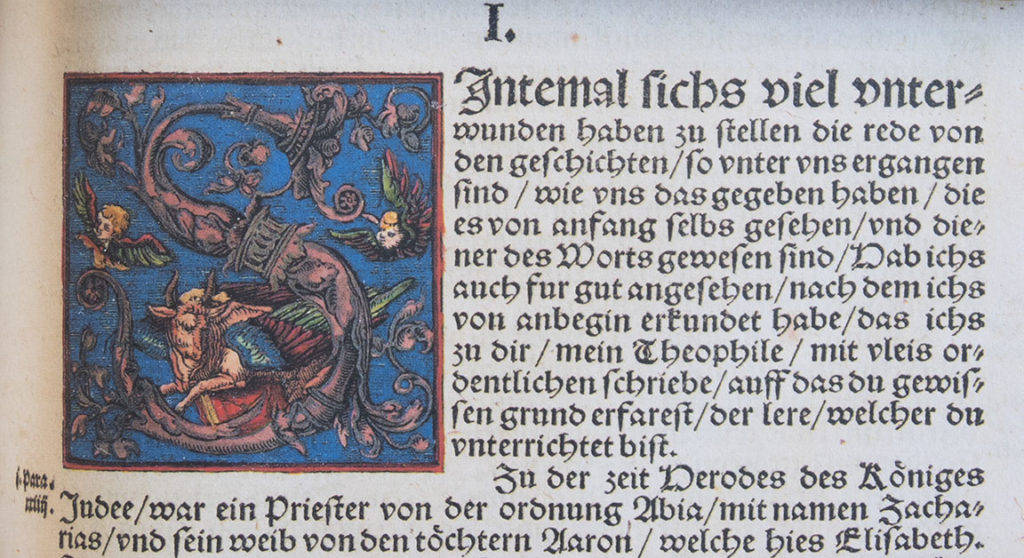
Luther Bible, Luke 1
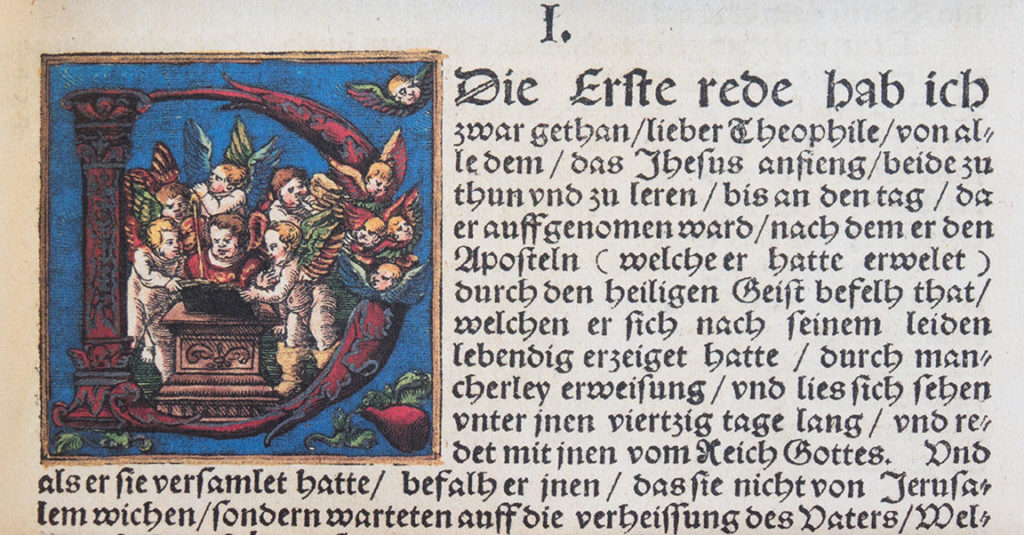
Luther Bible, Acts 1
Luke has included in his narrative lots of unique events, for instance, the birth of John the Baptist, the angels singing to the shepherds, the Baby Jesus in a manger, the boy Jesus teaching the teachers in the Temple. He repeats the well-known parables of the Good Samaritan, the prodigal son, and the story of the different prayers of the Pharisee and the publican (or tax collector; the one who said, “God be merciful to me, a sinner!” Luke 18:13). The Biblical songs or canticles found in the Gospel of Luke are Magnificat (Mary’s Song, “My soul magnifies the Lord…”), the Benedictus (Zechariah’s Song, “Blessed be the Lord, God of Israel…”), and the Nunc Dimittis (Simeon’s Song, “Lord, now lettest Thou Thy servant depart in peace…”).
Luke was a physician and well-trained in the Greek language. It was thought that he used specifically medical terms when describing diseases or Jesus’ sweating blood in Gethsemane, but it has been more recently discovered that those words were widely used in Greek literature, more so than just among physicians. He wrote (with the guidance of the Holy Spirit, of course) for the benefit of Gentiles who might not have been aware of Jewish ceremonial requirements or have an extensive background in Old Testament history. Church legend also claims Luke was an artist or painter. Each of the Four Evangelists has been associated with a “living creature” symbol, which are borrowed from the vision that originated from Ezekiel 1. Luke’s symbol is the ox or calf, and it is sometimes depicted with wings. The other symbols are the angelic man (Matthew), the Lion (Mark), and the Eagle (John).
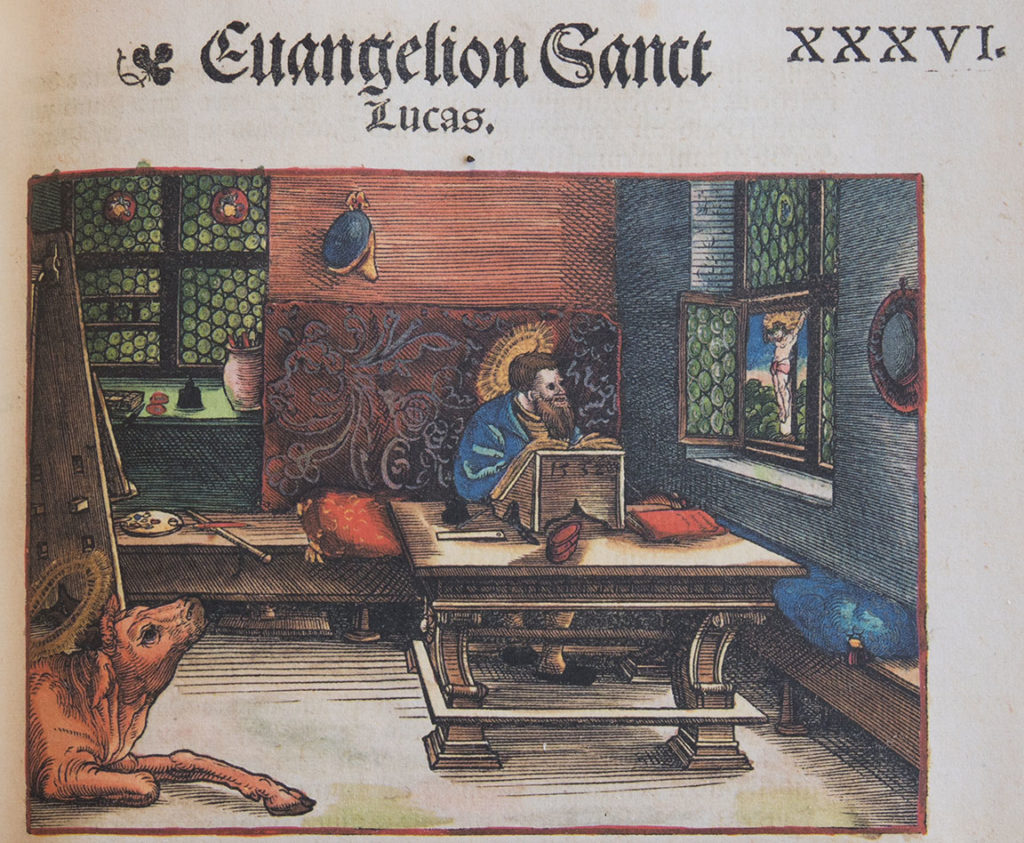
The Ox, Luther Bible
God bless your observance of this unique gift to the church, the Gospel-writer or Evangelist Saint Luke!
Yours, in Christ’s service,
Pastor Stirdivant

Mt. Rubidoux